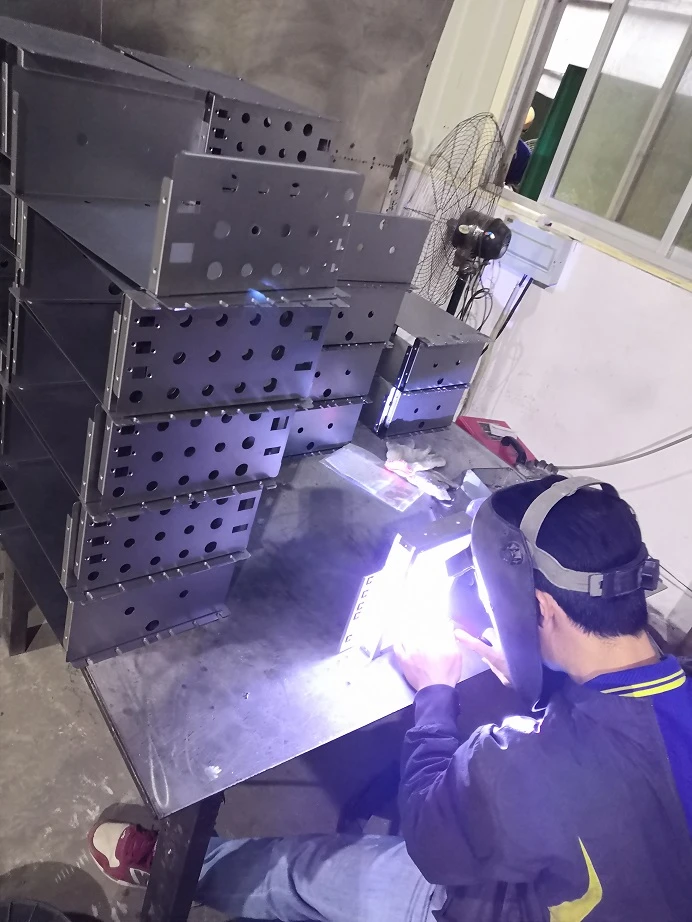Manual Welding & Fabrication
- TIG Welders.
- MIG Welders.
- Steel Rated Spot-Welders – .250” max thickness.
- Aluminum Rated Spot-Welders – .250” max thickness.
Shengen have strong welding capabilities for the fast and efficient metal fabrication of parts needed for a wide range of companies and markets.
We can offer resistance spot welding (RSW), gas metal arc welding (MIG) ,Robotic welding and gas tungsten arc welding (TIG). The type of welding will vary for each individual project.
For any further information in how we can offer quality and cost effective welding and metal fabrication solutions, contact us today.

Sheet metal welding service is a costly and time-consuming process that is difficult to get right.
When sheet metal welding service is done wrong, it takes a toll on your business and your customers. Even though it is not the customer’s fault. They are counting on you to know what you’re doing, but sometimes you don’t know how to handle sheet metal welding services properly.
Save your time and money by using our sheet metal welding services! We can get the job done right, promptly, and with little stress on you or your company. With our Sheet Steel Services, you can rest assured that everything is going smoothly from start to finish.
Are you looking for a qualified sheet metal fabrication subcontractor? If it’s Yes, Shengen will be your top choice!
Sheet metal is a type of metal that is made from a wide variety of materials, including copper, steel, aluminum, nickel, titanium, gold, and more. This material is resistant to heat and stands strong against corrosion. Durability is its another quality.
It is used in various applications, from furniture to appliances. There are several forms of sheet metal, including thin sheets, coiled strips, ribbed, and perforated.
Sheet metal is widely used in automobiles, electronics, home appliances, and more. It is lightweight so traporting this material is also easy. It is also water-resistant, therefore using it outdoors is ideal. Sheet metal is a durable material that can last for years.
The sheet metal welding process starts with a blank sheet of metal. After blanking, it can be shaped into a variety of shapes. Using various tools and equipment, the manufacturer can cut the metal into the desired shape.
Sheet metal welding service is a type of metal fabrication that is utilized to create a variety of structural and non-structural metal components. The process is used in industries like automotive, aerospace, military, and construction.
The sheet metal welding service involves the use of tools such as shears, brakes, presses, and rollers to cut sheets of metal into various shapes and sizes. This can be done by hand or with the help of power tools.
Sheet metal welding is a process that can be used for many different purposes. Emplying the right welding procedure is essential to produce a strong joint. This can prevent damage and injury. The strength of the joint can be as great as that of the base metal itself.
Sheet metal is a cheap and durable material. It won’t break on bending or streaching. Because of these qualities it becomes useful for a variety of applications. When sheet metal welding is used in customized ways, it can complement the design and structure of the project.
Sheet metal can be bent into a wide range of thicknesses. It can also be given any shape of any size. However, the internal bend radii of sheet metal need to be consistent to prevent defects and distortions in the finished products.
A sheet metal welding service can use a variety of tools to make a strong, stable, and permanent joint. Some processes include laser cutting, TIG welding, shearing, and plasma cutting.
There are several sheet metal welding methods available, including stick welding and MIG. While many factors affect the process, the most important skill is controlling heat across the sheet.
Sheet metal welding is compatible with a wide range of materials. But, you should choose only that methd, which is the best based on your particular application.
For example, a thin sheet of aluminum will require a different technique than steel for sheet metal welding. In addition to selecting the right method of sheet metal welding, you will also need to ensure you have the necessary tools required for sheet metal welding.